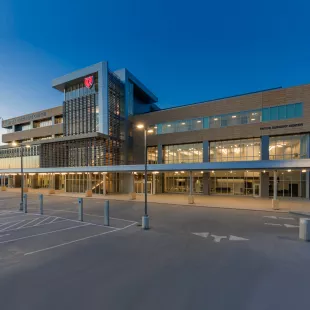Nosebleeds Are Common
It’s very common to experience an occasional nosebleed. A nosebleed happens when blood vessels inside the nose, which are very fragile, start to bleed. This is often caused by dry air, but can also be caused by trauma to the outside of the nose and nose picking. Most nosebleeds are not serious and will stop on their own. Seek care if the nosebleed has lasted longer than 30 minutes with compression or involves a large amount of blood loss.
How to Treat Nosebleeds
Most nosebleeds can be controlled by holding firm pinch pressure to your nostrils together on the mobile, non-bony tip of your nose. When that doesn't work, an ear nose and throat or ENT specialist at Nebraska Medicine can find the vessel that is bleeding and apply chemical or electricity cautery to stop the bleeding and seal off the wound. Typically before this is done the nose is numbed by medications first to make it more comfortable.
Breaking the Nosebleed Cycle
Nosebleeds can occur frequently in clusters. This is often because a scab forms to stop a nosebleed then this dried out scab will slough off and cause trauma that will lead to another nosebleed a few days or hours later or when you shove tissue up your nose to stop the nosebleed you are doing the same thing. The way to break this vicious cycle is to keep the scab from drying out and to not put tissues in your nose. Using a nasal lubricant several times a day after a nosebleed will keep it moist and prevent the scab from coming off and starting another nosebleed. Salt water and over the counter sprays or gels are often very helpful as well.
A deviated nasal septum will lead to a person having more frequent nosebleeds on one side more than the other because the deviated side will dry out more. Fixing the septal deviation may decrease nosebleeds in this situation.
Nosebleeds and Children
Children are equally prone to nosebleeds as adults but they typically have them for different reasons. Because children get frequent colds that irritate the lining of the nose, they can develop nosebleeds as result of this. Children are also more prone to digital trauma or nose picking that often leads to nosebleeds.
Adults tend to have more medical reasons for nose bleeds, such as being on blood thinners, having high blood pressure, requiring supplemental oxygen, and using nasal steroid sprays that can predispose them to nose bleeds.
Expertise Close to Home and Here to Help
For simple or chronic and complex issues, the Nebraska Medicine Ear, Nose, Throat (ENT), Allergy & Audiology Clinic is here to help at convenient locations in the metro Omaha area.
Our Locations
-

Ear, Nose, Throat (ENT) and Audiology at Village Pointe Health Center
110 N 175th St.
Get Directions
Omaha, NE 68118 -

Ear, Nose, Throat (ENT), Allergy and Audiology at Lauritzen Outpatient Center
4014 Leavenworth St.
Get Directions
Omaha, NE 68105
Highly Ranked Care
Nebraska Medicine is ranked among the nation’s best. Each year, U.S. News & World Report surveys the nation’s roughly 5,000 hospitals to come up with the year’s list of Best Hospitals.
Just 3 percent of the hospitals analyzed for Best Hospitals earn national ranking in even one specialty. We were ranked nationally in ENT in the 2017 U.S. News & World Report Best Hospitals ranking and recognized as a high-performing hospital in ENT in the 2011, 2012, 2013 and 2014.



